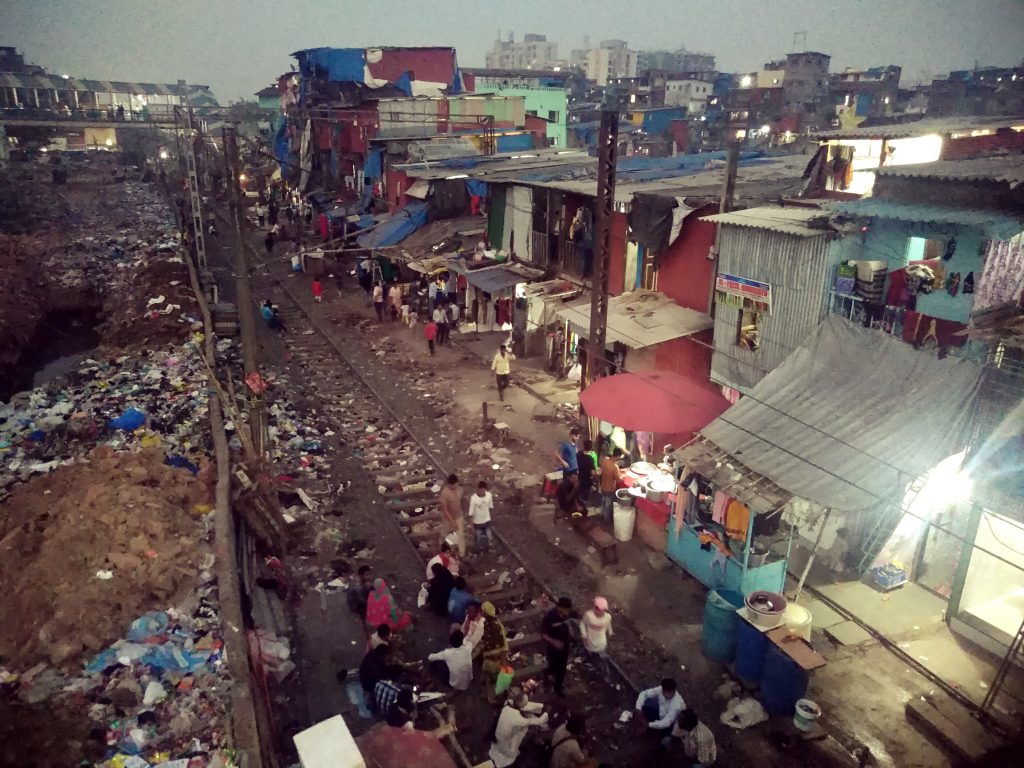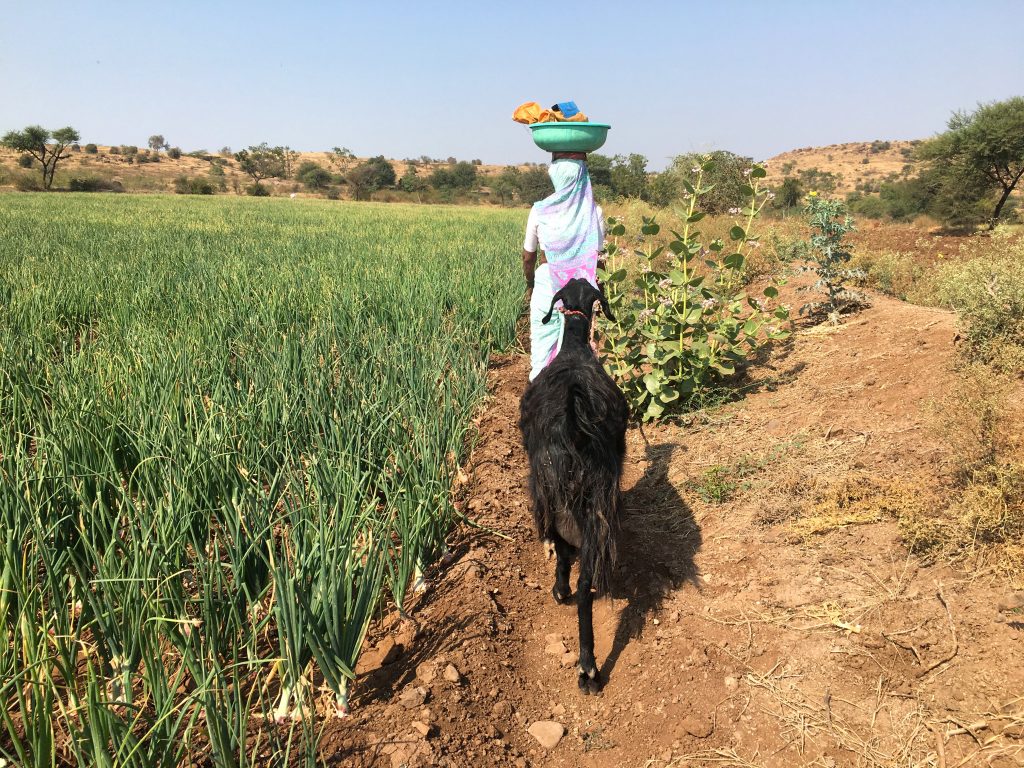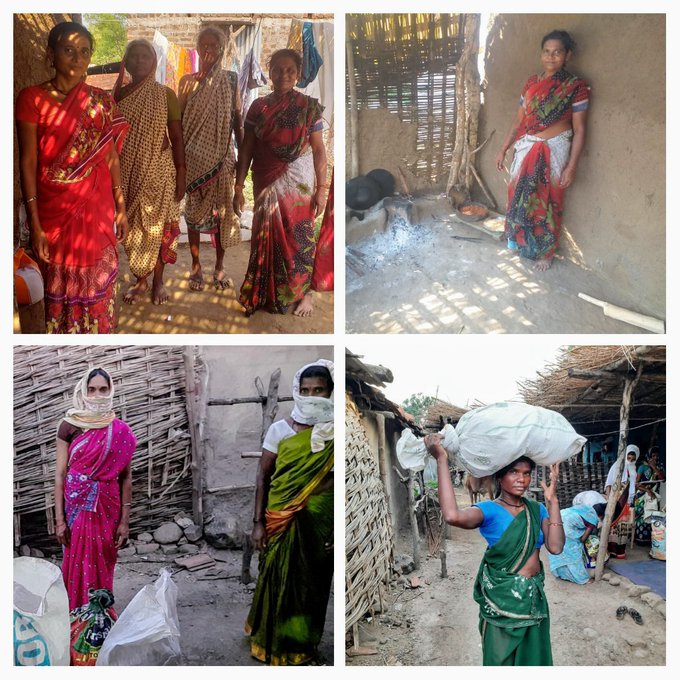By Irene Leonardelli, Arianna Tozzi, Enid Still and Sandeep Kumar
In part II of our series on the uneven experiences and everyday challenges of lockdown conditions in India, activist-researchers Seema Kulkarni and Sneha Bhat are interviewed about their work on the frontlines of COVID-19 relief efforts for migrants and women farmers in Maharashtra.
This blog piece is the product of a collaboration between four young researchers focusing on socio-ecological transformations in rural India from a critical feminist perspective. Witnessing the unfolding outcomes of COVID19 lockdown measures across India from places of relative safety, we have been reflecting, reading, and discussing together about the impacts of the lockdown in Maharashtra, where three of us have lived and worked in recent years.
Maharashtra’s economy is disproportionately dependent on the informal sector and more than half of the population relies on agriculture for their livelihood. The rampant inequalities between city dwellers and between urban and rural areas have become more prominent and amplified in the current pandemic (see also Part I of this blog series), with slum residents, migrant workers and marginal farmers being those most affected by the lockdown. Many do not have access to the social protection schemes announced by the government to support the most disadvantaged sections of the population during the current crisis. Among them, single women, widows, the landless and Dalits are further invisibilised and marginalised by patriarchal and Brahminical norms and customs (i.e. the inter-relation of caste and gender hierarchies with imaginations of hindu supremacy), which shape everyday life, rights and access to welfare services all over India. For instance, many single women are unable to register for ration cards to purchase subsidised food grains through the Public Distribution System.
The lack of support provided by the state has left millions of migrant workers and farmers dependent on the support of civil society organisations. Collectively, these organisations have been mobilizing and fundraising to provide food and shelter, raising their voices to advocate for the rights of disadvantaged groups, to make them visible and to denounce the state’s blindness.
Wanting to understand these dynamics and to learn more about the everyday work of civil society groups in Maharashtra, we interviewed Seema Kulkarni and Sneha Bhat, two activists and researchers and our mentors at the Pune-based Society for Promoting Participative Ecosystem Management (SOPPECOM), which is also part of MAKAAM, a nationwide network fighting for the rights of women farmers. Seema and Sneha have been on the frontlines of COVID-19 relief work since the first day of the lockdown. Here is an edited version of the interview, which we hope will give more visibility to their work and the people they support.
Can you tell us a bit about the consequences of the lockdown in Maharashtra and particularly what have been the impacts across its population?
“They say that this is a disease brought by rich people travelling abroad, and yet it is the poor who are suffering the heaviest impacts. On top of a lacking health infrastructure, this economic impact of the lockdown on informal migrant workers and farmers will probably be the biggest challenge for Maharashtra and for India in general.
Immediately after the lockdown was announced and all forms of public transportation including inter-state transport came to a halt, migrant workers in cities across the country, who had lost their jobs and homes started walking for hundreds and thousands of kilometres, as they were scared of dying from hunger and just wanted to go home. In Mumbai and Pune, most of these people are informal workers who come for a few months to work in the cities and don’t have any savings, nor cash.
In Pune, the government has set up some shelter homes for stranded migrants while we have also started a small Pune Migrant Support group for those coming from states like Bihar, Chattisgarh or Jharkhand. Every day we receive desperate calls saying: “Don’t get us food, we just want to go back home”, but it is uncertain whether their home states would be able to accept them back. Here they live in places of high contagious risk and the health infrastructure in their home states is very poor. Estimates say that there are approximately 750.000 migrants in Maharashtra alone, so if all of them decided to go back, it would be very problematic.
Other, more long term migrants do have a home in cities, yet many don’t have ration cards, so they are unable to access the food supplies the government pledged to provide to address the COVID19 crisis. In this case, NGOs are also providing them cooked meals, with the help of online delivery services.”

Mumbai. Photo: Irene Leonardelli
And what about farmers?
“At the beginning we didn’t think the lockdown would impact rural areas so much. We thought there was no reason for farmers to stop working in the farms, if they were respecting all the safety precautions. But then we realised that these lockdown measures were creating a lot of troubles for farmers too.
With the end of the Rabi season [winter cropping season] a lot of crops went rotten in the fields: farmers could not harvest produce as agricultural labour work was suspended post lockdown. The harvested produce could not reach the markets as transportation was becoming a huge problem. Farmers were either forced to ‘distress sell’ their produce at very low rates or, on several occasions, to dump it in open fields. In some places, as a humanitarian gesture, they distributed their produce in their own villages to the landless or to migrants and other needy people.
Moreover, the government procurement centres are closed, so farmers who do have produce to sell have no other option but to engage with the private market and the rates are very low. In fact, the prices people pay for food supplies are going up, but farmers are paid less. This situation is going to have long-term impacts as farmers will not have any cash to invest in the coming season. The situation of agricultural labourers is even worse. Smallholders can at least count on the help of their family members but labourers are not getting any jobs.”
How are women farmers in particular affected by the lockdown?
“Women farmers, particularly single women, widows and landless are definitely among the most affected by this lockdown. They are telling us: “I don’t have more than 50INR (0.60EUR) and no free ration has been given to me, how am I going to last for another 3 weeks?” The key issue is that many single women in rural areas do not have ration cards in the first place, so they don’t have access to the government’s food distribution scheme. Moreover, in many places there is a shortage of food grains, so even women who do have ration cards often do not get enough food. And, with schools being shut, the midday meals children used to get as a form of social support are no longer provided everywhere. This becomes an extra burden for women.
There are also many women who regularly sell their vegetables in weekly bazaars and markets in nearby towns. But these, unlike the larger mandis [city markets], have been closed so women do not have a place to sell their produce, whether it is fruit, vegetables, milk, poultry or eggs. We are talking about petty vending, smaller vendors who don’t have organised networks to sell their produce to large procurement centres. There have also been cases where the police have harassed women who were trying to sell their produce. On top of all this, domestic violence is increasing at a frightening rate, like everywhere else in the world. Imagine families of ten who share very small houses, it is a big issue.”

A women farmer and her goat. Maharashtra, March 2020. Photo: Irene Leonardelli
What has been the state and central government response to these challenges and the role of civil society organisations?
“The central government’s response has been largely inadequate. It announced the lockdown without any preparation and without considering the needs of the many migrant workers who, after losing their jobs, just desperately wanted to go home. So, as they shut down transportation across the country and urged people to stay back so as not to spread the disease, they were unable to provide them with the shelter and food supplies that would have allowed them to stay in safety and dignity.
In terms of economic support, the state announced the provision of 1.7 Lakhs Crore INR (25 billion EUR) towards various social security schemes, including direct cash deposits of 500INR (6EUR), advance pensions for widowed women, 5kg extra food grains and 1kg of pulses on top of the ration card quota, and free gas cylinders for three months. There are many such schemes. However, the issue is that they do not reach the people in need. For example, the list of people registered for food rations was last updated during the 2011 census. After 9 years there are probably 100 million people who have been left out. Also, the scheme still requires people to purchase the subsidised quota upfront, resulting in a sort of a ‘buy one get one free’ scheme, which in a cash-starved economy is simply unfeasible.
Overall, the government has failed to respond adequately to this crisis, when it comes to the needs of its marginalised population. The few schemes they have provided are often very difficult to access.. Some states have been able to put in extra money for support, but in Maharashtra, which is both one of the hardest hit by the virus as well as home to a large migrant population, the state has simply been unable to cope.
Civil society organisations, as I mentioned, are mobilizing across multiple networks. We provide shelter homes and food for migrants who are left in the city and we are talking directly to the government, asking for a more adequate response. Yet, it is disheartening to see that not only is the government lost and does not know what it is doing, but it is also unwilling to acknowledge the contribution of civil society. What we can do collectively is not much, and to make a difference we really need the government’s support to mobilise resources and coordinate efforts.”
What kind of initiatives/networks of care and solidarity are arising in Maharashtra? How are they mobilising under lockdown restrictions?
“As part of the MAKAAM network, we coordinate our activities from home. In the initial phase we spent time talking to people, understanding their problems and the type of support required. Food clearly emerged as the most immediate need. We then organised a fundraising campaign, prepared a list of 600 women and locally, in a decentralised manner, we procured the food rations, organised the food kits and began distribution. Currently, we are reaching women in fourteen districts in Maharashtra, mostly in the suicide affected districts of Marathwada and Vidarbha, where MAKAAM’s presence is higher. But we are also reaching two other districts: Raigad in the Konkan coastal area, and Nandurbar, in the northern, tribal region.
To distribute food kits, the front line workers needed a government authorised transportation pass, and we developed a set of ‘good practice’ guidelines – keeping distance, washing hands, and wearing masks. We also developed guidelines about the ideal food kit, suggesting it should include not just wheat and rice but also pulses and nutritious food, as well as soap, sugar, spices, salt and peanuts – the kinds of things people cannot get through the ration system. The partner organisation then prepared the kits according to the local food practices and market availability. This is a one time, one month supply but we will have another series of calls with our partners to see how we can support these women long-term.

Women receiving essential supplies in Yavatmal district, Maharashtra. Source: MAKAAM.
The second phase will be about understanding the drinking water and irrigation situation, and the challenges women will face as they go back to work. This will involve direct help for women but also advocating for targeted government programmes, particularly for farming communities. For example, the cropping season, Kharif, starts in June, so at least some of the women farmers will soon require seeds and other agricultural inputs.
Initially, support was much more about addressing the immediate crisis. Now, in parallel, we have to get the government to act because we are just a drop in the ocean. What is 600 women when you are talking about a 12 Crore (120 million) population state? So we will be constantly trying, constantly voicing to the government that these are the unserved areas, these are the women and the populations you are not reaching out to. I think this is going to be a constant activity in our long term strategy for MAKAAM.”
Irene Leonardelli ([email protected]) is a PhD student in Feminist Political Ecology at IHE Delft Institute for Water Education, in the Netherlands, and WEGO-ITN PhD fellow, who has received funding from the European Union’s Horizon 2020 research and innovation programme under the Marie Sklodowska-Curie grant agreement No. 764908. Her research focuses on processes of agrarian transformation and water governance in Maharashtra from a feminist perspective.
Arianna Tozzi ([email protected]) is a PhD student in Human Geography at Manchester University, UK. Her research focuses on the intersecting impacts of climate change and development policies in drought-affected areas in Maharashtra from a feminist perspective.
Enid Still ([email protected]) is a PhD student in Feminist Political Ecology at Passau University, Germany, and a WEGO-ITN Marie Sklodowska-Curie Fellow, who has received funding from the European Union’s Horizon 2020 research and innovation programme under the Marie Sklodowska-Curie grant agreement No. 764908. Her research focuses on the politics and ethics of organic food relations with farmers and traders in Tamil Nadu from a feminist perspective.
Sandeep Kumar ([email protected]) is a socio-cultural anthropologist, currently working as a Junior Research Fellow in the TIGR2ESS project at M.S. Swaminathan Research foundation, Chennai, where he is conducting research on the livelihood changes of coastline farmers in Poompuhar, Tamil Nadu.







One Comment